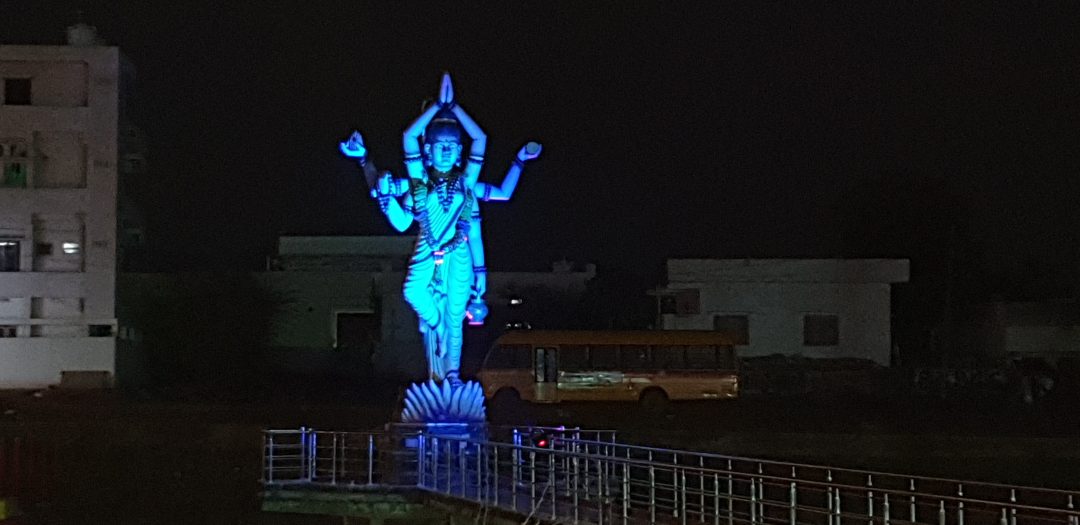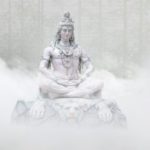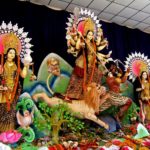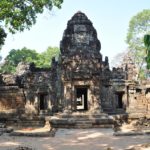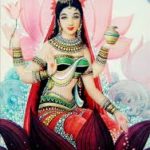Goddess Parvati is also known by the name of Aparna. It means A (without) – Parna (leaf) without a leaf. There goes an interesting story in Hindu Mythology as to how Parvati came to be known as Aparna’s leafless one.
Himavan The King of the snow-clad peaks of the Himalayas and his wife Mena gave birth to a beautiful daughter, Uma, also known as Parvati, daughter of the mountains.
Parvati was Sati re-born, the mother-goddess herself, determined to make Shiva a householder once again.
After Sati had immolated herself in her father Daksha’s Palace, being humiliated before all the Gods by her very own father who denounced her husband Shiva as a wild, beastly, indecent vagabond – Shiva full of remorseful agony for his dead wife, isolated himself and led a reclusive life in the icy caves of the Himalayas in his abode Mount Kailasa. He rejected the world outside.
Determined to draw Shiva out of his cave and make him her consort, every day, Parvati crossed the cold mountain valleys and went into his cave with gifts of fruits and flowers, hoping to win his love. She would sweep the floor and tend to the fire so that he might take notice of her.
He never did. Not even once did he open his eyes to look upon her charming face. He either meditated or he smoked his pipe, the chillum, and lost himself in narcotic dreams. Parvati knew that she wanted Shiva for a husband. But how would she win his heart if he never looked her way?
Death of Kama:
Parvati invoked Priti (the goddess of love and longing) and Rati (the mistress of erotica), to rouse Shiva out of his meditation. They entered Shiva’s desolate cave and transformed it into a pleasure garden of fragrant flowers, spring breezes, dancing nymphs, buzzing bees and singing mynahs. Kama The God of Lust and Desire also joined in with his Consort Rati, and with his sugarcane bow sent love-darts and arrows dripping with desire into Shiva’s heart.
Shiva was rather furious than amused. In his anger, he opened his third eye and with a flame of fury engulfed Kama’s beautiful body and reduced it to ashes. With desire so brutally crushed, the cosmic sage resumed his meditation.
“What have you done?” cried Rati, Kama’s beloved Consort. “Without desire, the bull will forsake the cow, the horse, the mare and the bees, the flowers. There will be no homes, no families, as men and women will not love each other. Society will collapse and life will be devoid of its very essence. Desire may be the cause of suffering, but it is also the reason for joy. What is life without it? An existence without flavor.”
Rati’s lamentations moved Shiva. He saw the wisdom in her words. He realized that complete rejection of the world made little sense. Living had its price – suffering; it also had its reward joy. One came with the other. Together they gave a reason for surviving.
The death of Kama alarmed the Gods: “Without the Lord of Desire, man will not embrace woman and life will cease to be.”
Parvati said: “I shall find another way to win Shiva’s heart. When Shiva becomes my consort, Kama will be re-born.
Parvati’s Penance:
Parvati realized that she had to prove the earnestness of her feelings if she wished to be Shiva’s Consort. Perhaps he would marry the mountain princess if her love for him was true. With her, he would find the balance between Yoga and Bhoga.
 She went into the forest and performed rigorous Tapas, wearing nothing to protect her tender body from the harsh weather, eating nothing, not even a leaf, earning the admiration of the forest ascetics, Sadhus and Sages, who named her Aparna the leafless one.
She went into the forest and performed rigorous Tapas, wearing nothing to protect her tender body from the harsh weather, eating nothing, not even a leaf, earning the admiration of the forest ascetics, Sadhus and Sages, who named her Aparna the leafless one.
Parvati focussed her mind on Shiva. She thought of nothing but him. She ate nothing, drank nothing, she only chanted his name. She sat so still that ants began to crawl on her skin and lizards slithered over her limbs, taking her to be a rock. The Sages were impressed by the determination of the mountain princess to endure such an endless fast for so long a time. They gathered around her and blessed her. “She is Aparna, the girl who refuses to eat even a leaf,” they said.
Aparna matched Shiva in her capacity to cut herself from the world and completely master her physical needs. The power of her Tapas shook Shiva out of his meditation. Her persistence was amazing. Shiva was impressed. He stepped out of his cave and accepted Parvati as his wife. He married her in the presence of the Gods with sacred rites before the holy fire. The cosmos rejoiced.
Parvati melted Shiva’s stern heart with her affection.
Together they played dice on Mount Kailasa and sported on the banks of Lake Mansarovar, discovering the joys of married life. The Goddess also awakened Shiva’s concern for the world by questioning him on various issues about nature, society, life and marriage. As he spoke, he revealed the secrets of the Tantras, the mysteries of the Vedas and the splendors of the Shastras that he had gathered in aeons of meditation. Thus his great wisdom was revealed for the good of the cosmos. Parvati was the perfect student, Shiva the perfect teacher. The world was enriched by these sacred discourses. Inspired by Parvati’s beauty, Shiva became the fountain-head of music, dance and drama. He sang and danced to the delight of the Gods who were pleased to see his enchantment with the Goddess. He came to be known as Lord of the Arts Kaleshvar.
The Cosmic Couple:
Parvati and Shiva complemented each other perfectly. She was gentle and graceful; he was wild and forceful. She domesticated Shiva and turned him into a householder, much to the satisfaction of the Gods. She softened the stern hermit with sweet words; her smile stirred love in his austere heart. When she embraced Shiva and the two became one in a sacred union, Kama the Lord of Desire the catalyst of all creative forces was re-born. The twang of the Love-God’s Bow and the fragrance of spring filled the air. The cosmos and the Gods cheered this divine union.

